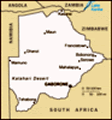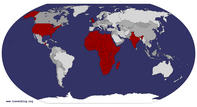Advertisement
Published: January 3rd 2008
BOTSWANA
PART I
LADIES AND GENTLEMEN, PLEASE STAY SEATED
A whistle blows, an engine starts and a large pulley begins to turn. Now we are swinging above the Limpopo River, leaving the paved roads of South Africa behind and gliding in a suspended open basket towards the verdant riverbank in Botswana. In 1966 there were only 3 kilometers of paved roads in the entire country of Botswana. There are still none where we are going.
The swollen Limpopo River is flowing brown and thick between its electric green banks. It’s so full that the behemoth Toyota Land Cruiser, the one that usually fords the river with ease, has to wait on the other side. We have to cross in a little wire cage pulled through the air by a thick cable.
There is only a frontier border shack and the Land Cruiser waiting for us. They look lonely and forlorn sitting in the cool drizzle. It’s been raining for three days. This is why it’s so uncommonly green, why the wide-open rolling savannah is carpeted with yellow flowers.
“We must hurry,” says Jakes, the ranger from Mashatu Game Reserve as the
cage bobs and dances to a halt on the Botswana bank of the Limpopo. Apparently the Toyota still needs to plow through a number of smaller rivers, and the water is rising. The vehicle is a beast, half armored personnel carrier, half Sherman tank. It is a stripped bare, open topped, utilitarian, earth colored. We learn that the animals regard it as just another odd species.
The Land Cruiser descends down impossibly steep riverbanks, pushes through running water, climbs up forty-five degree angled rocky outcroppings. I am certain it could climb a tree if necessary. At times it seems as if Jakes is about to stand it up on its nose like a circus animal. He tells us that one time a group of Japanese tourists eschewed the search for animals and preferred instead to have him climb in and out of steep watercourses while they yelled “Toyota, Toyota!”
Tent Camp is a forty-five minute drive through this open wild country. It stretches out ocean-like, rolling, with red cliffs in the distance and thousands of stunted mopane trees scattered all around us. We arrive wet but just in time for afternoon tea. Our tent is more like a
glorious hotel room wrapped in canvas and screen. One of the staff tells us that we are not to sit out on the little patio after dark. Although the camp is surrounded by electrified fence to keep out the elephants and the big cats, he can’t guarantee it. And then there are smaller things. Smaller things?
At tea we meet the other guests. There are three from England, two from France, and a family of four German expatriates who have been living in Botswana for twenty years. Dan, the Ranger who will be driving one of the Land Cruisers, suddenly steps into the open air thatched roofed terrace, carrying a sizable rifle. He looks slightly out of place among the quiche and teacups.
“Ready?” he calls out jovially.
Now the sight of a Ranger carrying a rifle that looks more like a cannon is at once both comforting and disconcerting. He handles it casually, like he’s holding an umbrella, or a walking stick. I ask to see the shell. It looks more like artillery ordinance.
We are all given foul weather gear because it’s still drizzling, and then we climb into the open Land Cruiser. Richard,
the other well-armed Ranger in the second vehicle addresses the newcomers.
“Never, for any reason, stand while we are viewing the animals,” Richard tells us. “They see the vehicle as one being, and if you were to suddenly change our shape it could frighten them and might cause them to charge.”
Sounds reasonable. We sit right behind Dan, with Old Betsy mounted on the dash. We drive out of the camp, down a steep embankment, through a small river, and then begin to cruise slowly through the 75,000 acres that make up Mashatu Game Reserve. It is an unfenced Reserve so the animals are free to migrate through and into the contiguous territories, and into Zimbabwe and South Africa. Justice, our “tracker,” is perched on a seat in the back of the Land Cruiser. These guys are locals who have worked in the Reserve for years and have gained their knowledge by living here, not in PhD programs. However, they have now qualified as “Rangers” after taking government sponsored exams. There is no hunting allowed in the entire country of Botswana. Dan and Justice, we are soon to find out, have soft spots in their hearts for the
animals that live here. They also possess eyesight that could easily be described as “off the charts.” Off the optometrist’s chart, that is. If Jason Varitek were to hold up an eye chart behind home plate at Fenway Park, Dan could easily read the bottom line from deep center. Justice could read it from the bleachers.
“Look there,” Dan says, “A baby impala hiding in the grass underneath that tree.”
“That tree?” I ask incredulously, “ You can see something underneath that tree?” He’s pointing out a tree that is about three hundred yards away. There’s no way he can see this, I’m thinking to myself. But sure enough, we drive closer and there it is, curled up in the tall grass waiting for her mother to come back.
Then Justice spots elephants on a hillside about a mile away. Dan spies a giraffe’s neck poking up from the trees about two miles away. It’s uncanny.
We pass a sizable tree up on a hill overlooking a river. Dan stops the vehicle and turns off the engine. The riot of various birdcalls is almost deafening.
“Look here in this tree,” he says, “See the two
baby impala up there in the branches. A leopard just killed them and dragged them up into this tree for safekeeping, so the hyenas and the jackals can’t get them. She’ll come back later for dinner.” The beautiful little creatures are draped there in the crooks of the trees like elegant throws.
Justice says something in Setswana, their native tongue, and Dan starts the engine and proceeds overland, slaloming through mopane trees, along a ridgeline overlooking the river valley. He finds an open spot with a clear vantage point and stops, cutting the engine. Again the sound of the birds is overwhelming. Across the river we see the slow brown lumbering of elephants.
“Here comes one of the young boys bringing up the rear,” Dan says as he points to our side of the river. We watch as a young bull comically slides on his big butt down the steep muddy embankment. He continues his leisurely stroll across the gravel of the riverbed following the small group who has already disappeared into the trees. His ascent up the opposite bank is equally entertaining to watch. It seems that such a huge creature could hardly negotiate this terrain. But
he uses his trunk as well as his legs and we watch as he muscles himself up over the muddy hillside, leaving an almost artful smear that resembles finger painting on a grand scale.
We drive on. There are impala everywhere. Groups of males (bachelor herds) with their stately horns stare at us impassively, then dart off suddenly into the bush. Larger groups of females with their babies are even shyer. Certainly they must know how deliciously tempting their little ones appear to the many predators. Then we see huge eland, and kudu, and a bounding miniature antelope called a steenbok. We pass a huge mashatu tree that is filled with a hundred baboons. They drop out of the lower branches like ripe fruit.
What is so apparent already is how painfully alert all things seem to be. There is little time for relaxation for most of the inhabitants. A leopard, a lion, a jackal, a hyena, could be inching up at any time.
This lesson was indelibly etched in our minds on the morning we spent with Jeanette, the resident elephant scientist. We were in the middle of herd of about one hundred elephants, in itself
a humbling position. “Oh look there’s Sophie,” Jeanette would call out excitedly, or “Funny Face, I haven’t seen her in a while.” It was amazing just hearing their rumblings and trumpetings, smelling the proximate musk of this huge mass of mammals, watching how delicately they could pluck the yellow flowers with the tips of their trunks. Scattered around us were a number of impala, their light coats shining in the early sun. It was a beautiful commingling of colors - the various greens of the trees and the grasses, the earthy browns of the elephants, the honey coats of the impala, the yellow flowers. Then something extraordinary happened. And it only took about five seconds, but at the time it seemed to go on forever.
We were sitting quietly, listening to the cascade of morning bird calls and the munching of the elephants when at once there was a sound that set off an avalanche of sounds, one building on the next like some wild discordant symphony. Joseph, the Ranger accompanying Jeanette, heard the very first one, and when he announced it he seemed to become as intensely alert as the animals he was tracking.
“Impala kill,” he
said as his shoulders squared.
This first sound was a sickly panicked bleat, followed by the laughing call of a hyena. Then the herd of elephants, almost as an organism, began to trumpet and move, stampeding and making a thunderous sound.
“There, there,” Joseph said pointing to our left. We turned to see the hyena loping away with the small impala dangling limp from its powerful jaws, one blood red shock of color glinting in the morning light. The elephants continued to move in the opposite direction, trumpeting and roaring, lifting their trunks and flapping their ears. But they quieted quickly, sensing that the danger had passed. They resumed their grazing, and again it was simply birdsong.
“The elephants, they don’t like all that killing,” Jeanette said.
SOME ELEPHANT FACTS:
“An elephant’s trunk, a union of the nose and upper lip, is a highly sensitive organ with over 100,000 muscle units. Elephant trunks can get very heavy and it is not uncommon to see elephants resting them over a tusk. Elephants cry, play, have incredible memories, and laugh. Elephants are sensitive to fellow animals where if a baby complains, the entire family will rumble and go over to touch and caress it. Elephants have greeting ceremonies when a friend that has been away for some time returns to the group. They eat about 300 ponds of food a day. ”
(from elephant.elehost.com)
“A recent discovery is that much of elephant language exists in a range that humans can't even hear. The deepest sounds we can hear, the grunts or rumbles, are the mild overtones of low frequency sound from 1 and 20 Hz, which is below the level of human hearing. Such sounds are so low and powerful they travel unhampered for miles through forest, allowing elephants to send messages and warnings over long distances. These powerful, distant-traveling sounds are critical in helping males find females for breeding. Researchers say the infrasonic calls also enable elephants to reunite with friends and family members. One rumble means "Hello, I'm here," another "Help, I'm lost"-important messages for helping separated family groups find each other.” (from NATURE at pbs.org)
ALSO - CHECK THIS OUT!!!
http://www9.nationalgeographic.com/ngm/wildcamafrica
Advertisement
Tot: 0.079s; Tpl: 0.012s; cc: 9; qc: 29; dbt: 0.0309s; 1; m:domysql w:travelblog (10.17.0.13); sld: 1;
; mem: 1.1mb









